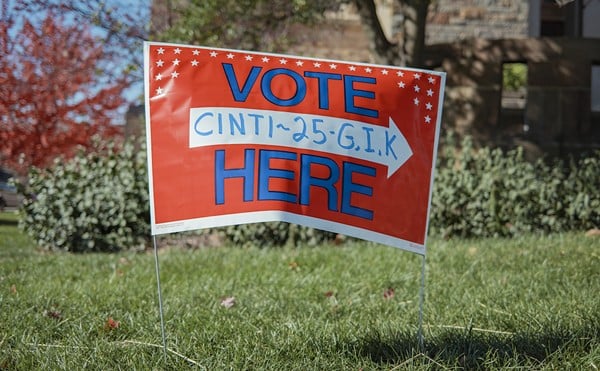|
Steve Loftin, president of the Cincinnati Arts Association (CAA), has decided not to take up Hamilton County Commissioner Todd Portune's suggestion that the organization drop its lawsuit against the Coalition for a Just Cincinnati. The coalition is the group that organized the "Artists of Conscience" boycott against Cincinnati and, along with others, convinced some artists booked by CAA to cancel their appearances here.
Portune wrote Loftin and CAA Chairman Dudley Taft on June 25 to suggest the organization take the first step to end the boycott stalemate by dropping its $500,000 lawsuit against the coalition (see ArtsBeat, issue of June 27-July 3). As a stakeholder in CAA — the county owns Memorial Hall, one of three facilities that CAA manages — Portune said the county should have been involved in initial discussions about suing the coalition and now wants to help resolve the situation.
Loftin responded via a letter dated July 2, writing, "We are not (as you suggest) fanning the flames of discontent or attacking political expression. To the contrary, we are trying to assure a constant stream of views — political and non-political — on our stages, but we cannot succeed if those who would voice those are kept away. Ironically, the boycott is discouraging precisely those performers that we suspect the minority community would like to encourage — that is, performers whom history has shown to appeal to the African American community."
Loftin writes that members of the coalition have declined CAA's requests to withdraw their boycott campaign and to mediate: "We have made it clear to the members of this coalition on several occasions — both publicly and privately — that we are more than willing to mediate the issues with them, and to enlist the participation of the City and County, if that might lead to an end to the problems which exist in the our (sic) community."
Hang Fire in Northside
Close to half of Stonewall Cincinnati's 226 members showed up at an emotionally charged general meeting on July 9. The meeting's purpose was a vote on a petition to remove the co-chairs, Roy Ford and Heidi Bruner, and another member, Mike McCleese, from the LGBT organization's board of directors (see Fissures in Stonewall issue of July 4-10).
The ballots were never cast. After more than three hours of earnest dispute, the meeting broke up with the seconded motion to vote "floating around somewhere," as one member put it.
The problems were less ideological than procedural. Members questioned the design of the ballot, which didn't specifically provide for a "no" vote, as well as the validity of petition signatures serving as absentee ballots. Consultations with Stonewall's bylaws and "Roberts' Rules of Order" failed to clear a path leading to a vote, and the meeting ended with an agreement to convene an election committee to resolve differences of interpretation about the ballots.
The membership will meet again to vote Sept. 10, one day short of a year after the controversial board of directors took office. Between now and then, it's hoped, Stonewall's factions will have a chance to cool off and to articulate their various opinions in a balanced way.
Hyland vs. the Hamilton Co. Board of Elections, Part 2
Marilyn Hyland still isn't on the ballot as an independent candidate for the Hamilton County Commission, but she's not giving up the fight. On July 10, the Hamilton County Board of Elections found that, after a second look, Hyland is 198 signatures short of qualifying for the ballot. Hyland believes she has 22 more signatures than required.
Hyland decided to run as an independent after the Hamilton County Democratic Party chose Dr. Jean Siebenaler to run against Republican Phil Heimlich. She collected 571 more signatures than the 2,830 required before the May 6 filing deadline, she thought. But the Board of Elections rejected 818 of her signatures after its standard first review, leaving her 247 short, turning them down because they were illegible or the addresses or the signatures didn't match the ones on the person's voter registration form.
During the second review of Hyland's petitions — ordered by Hamilton County Board of Elections Director Julie Stautberg — the board rejected 47 additional signatures because there was a zip code in place of the date, Hyland said. This left Hyland surprised and wondering if board workers were supposed to make a second attempt to exclude signatures.
Stautberg said the second review was a voluntary attempt to make sure everything was accurate and that the workers hadn't noticed the date and zip code errors before. But the board did agree with Hyland after the second review that 143 clearly registered voters had their petition signatures rejected by the board during the first review. Hyland said 124 of those rejections were because the voters printed their names instead of signing them in cursive, or vice-versa. The petition form, prescribed by the Ohio Secretary of State's Office, provides a space for a signature but not one for a printed name.
Hyland has until July 30 to appeal the Board of Elections ruling, which she plans to do. If she still disagrees with the board after then, the matter could head to the Hamilton County Court of Common Pleas, according to Stautberg.
Porkopolis TIP LINES: 513-665-4700 (ext. 138) or [email protected]





